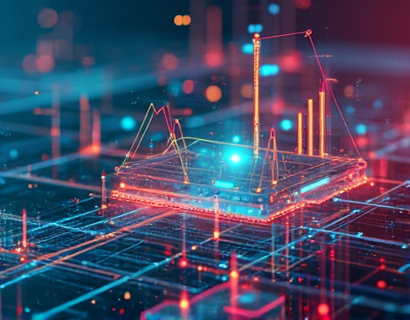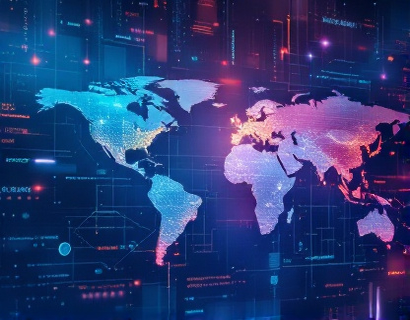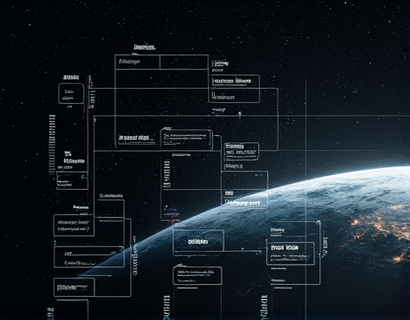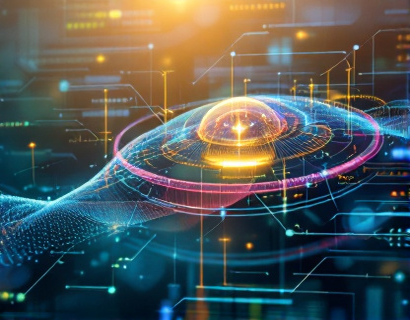Unlocking Enhanced Digital Experiences Through Crypto and AI
The intersection of cryptocurrency and artificial intelligence (AI) is paving the way for unprecedented advancements in the digital realm. As technology continues to evolve, the integration of these two powerful forces is redefining user interactions and driving growth across various sectors. This article aims to explore the transformative potential of combining crypto and AI, offering insights that are crucial for tech enthusiasts and professionals looking to stay ahead in the rapidly changing digital landscape.
The advent of blockchain technology has introduced a new paradigm in digital transactions, ensuring security, transparency, and decentralization. Cryptocurrencies, built on blockchain, have revolutionized the way we think about money and value. Beyond their role as digital currencies, cryptocurrencies are now being leveraged for a multitude of applications, from smart contracts to decentralized finance (DeFi) and non-fungible tokens (NFTs). Each of these applications is enhancing the digital experience by providing more efficient, secure, and user-centric solutions.
Artificial intelligence, on the other hand, is transforming the way we interact with technology. AI algorithms can process vast amounts of data, learn from patterns, and make decisions with minimal human intervention. When combined with the capabilities of blockchain, AI can unlock new levels of automation, personalization, and security in digital experiences. For instance, AI-driven chatbots powered by blockchain can offer more secure and transparent customer service, while AI algorithms can optimize blockchain networks for better performance and scalability.
One of the most significant ways crypto and AI are enhancing digital experiences is through decentralized applications (dApps). dApps leverage blockchain to create applications that are not controlled by any single entity, ensuring greater user autonomy and data privacy. AI can enhance dApps by providing intelligent features such as predictive analytics, personalized recommendations, and automated decision-making. For example, a decentralized gaming platform can use AI to create more engaging and dynamic gameplay experiences, while ensuring that the game's economy remains fair and balanced through blockchain mechanisms.
Another area where crypto and AI are making waves is in the realm of identity verification and digital credentials. Traditional identity systems are often centralized, vulnerable to breaches, and prone to misuse. Blockchain-based identity solutions, powered by AI, can offer a more secure and user-controlled approach. AI algorithms can verify the authenticity of digital credentials, reducing the risk of fraud and ensuring that only legitimate identities are recognized. This not only enhances security but also streamlines processes for users, making it easier to prove their identity across different platforms and services.
The financial sector is also witnessing a significant transformation through the synergy of crypto and AI. DeFi platforms are using AI to optimize trading strategies, manage risks, and provide personalized financial advice. Smart contracts, executed on blockchain, can automate complex financial transactions with precision and transparency. AI-driven analytics can help identify market trends and anomalies, enabling investors to make more informed decisions. Moreover, AI can enhance the security of DeFi protocols by detecting and mitigating potential threats in real-time.
In the healthcare industry, the combination of crypto and AI is leading to innovative solutions for data management and patient care. Blockchain can ensure the secure and private sharing of medical records, while AI can analyze vast amounts of health data to predict disease outbreaks, personalize treatment plans, and improve diagnostic accuracy. For instance, a blockchain-based platform can use AI to aggregate and analyze patient data from various sources, providing healthcare providers with comprehensive insights to enhance patient outcomes.
The creative industry is not lagging behind in embracing the crypto and AI revolution. Artists and creators can use blockchain to authenticate and monetize their digital works through NFTs. AI can assist in the creative process by generating unique art pieces, composing music, and even writing scripts. The integration of AI in the creative workflow can lead to new forms of artistic expression and open up new revenue streams for creators. Additionally, AI-powered tools can help manage copyright and royalty distributions on blockchain, ensuring fair compensation for creators.
In the realm of smart cities, the combination of crypto and AI is paving the way for more efficient and sustainable urban living. Blockchain can facilitate peer-to-peer energy trading, allowing residents to buy and sell excess renewable energy directly. AI can optimize energy consumption and distribution, reducing waste and lowering costs. Smart contracts on blockchain can automate various city services, from traffic management to waste collection, making urban environments more responsive and efficient.
The education sector is also benefiting from the crypto and AI convergence. Blockchain can create secure and transparent record-keeping systems for academic credentials, reducing fraud and simplifying the verification process. AI-powered learning platforms can offer personalized education experiences, adapting to the learning pace and style of each student. These platforms can use AI to provide real-time feedback, recommend relevant learning materials, and even predict student performance, helping educators tailor their teaching methods for better outcomes.
To fully harness the potential of crypto and AI, it is essential to address the challenges and considerations involved. Security remains a top priority, as both technologies deal with sensitive data and financial transactions. Implementing robust security measures, such as multi-factor authentication and regular security audits, is crucial to protect against potential threats. Privacy is another critical aspect, ensuring that user data is handled ethically and in compliance with regulations like GDPR. Transparency in AI algorithms and blockchain transactions can build trust and confidence among users.
Scalability is another challenge that needs to be addressed. As the adoption of crypto and AI grows, the underlying infrastructure must be able to handle increasing loads without compromising performance. Innovations in blockchain technology, such as layer 2 solutions and sharding, can help improve scalability. Similarly, advancements in AI, such as more efficient algorithms and better hardware, can enhance the performance of AI-driven applications.
Collaboration between different stakeholders is vital for the successful integration of crypto and AI. Industry players, researchers, and policymakers need to work together to establish standards, regulations, and best practices. This collaborative approach can foster innovation while ensuring that the benefits of these technologies are widely accessible and equitably distributed. Open-source projects and community-driven initiatives can play a significant role in accelerating the development and adoption of crypto and AI solutions.
For tech enthusiasts and professionals looking to stay ahead in this exciting field, continuous learning and adaptation are key. Staying updated with the latest research, attending conferences, and participating in online forums can provide valuable insights and networking opportunities. Experimenting with blockchain and AI projects, whether through personal projects or professional endeavors, can help build practical skills and a deeper understanding of these technologies.
In conclusion, the fusion of cryptocurrency and artificial intelligence is unlocking new dimensions of digital experiences, driving innovation, and transforming various industries. By embracing these technologies, we can create more secure, efficient, and user-centric solutions that enhance our daily lives. As the digital landscape continues to evolve, staying informed and proactive will be essential for anyone looking to thrive in this exciting new era.











































